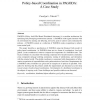Free Online Productivity Tools
i2Speak
i2Symbol
i2OCR
iTex2Img
iWeb2Print
iWeb2Shot
i2Type
iPdf2Split
iPdf2Merge
i2Bopomofo
i2Arabic
i2Style
i2Image
i2PDF
iLatex2Rtf
Sci2ools
ENTCS
2007
2007
Policy-based Coordination in PAGODA: A Case Study
PAGODA (Policy And GOal Based Distributed Autonomy) is a modular architecture for specifying and prototyping autonomous systems. A PAGODA node (agent) interacts with its environment by sensing and affecting, driven by goals to achieve and constrained by policies. A PAGODA system is a collection of PAGODA nodes cooperating to achieve some mutual goal. This paper describes a specification of PAGODA using the Russian Dolls model of policy-based coordination. In PAGODA there are two forms of coordination: local and global. Local coordination is used to compose the components of a PAGODA node. The local coordinator is concerned with ensuring component level synchronization constraints, cross component message ordering constraints, routing of notifications, and interaction with the external world. The global coordinator is concerned with dissemination of information, negotiation of responsibilities, and synchronization of activities. Requirements for a PAGODA node coordinator are given an...
| Added | 13 Dec 2010 |
| Updated | 13 Dec 2010 |
| Type | Journal |
| Year | 2007 |
| Where | ENTCS |
| Authors | Carolyn L. Talcott |
Comments (0)

